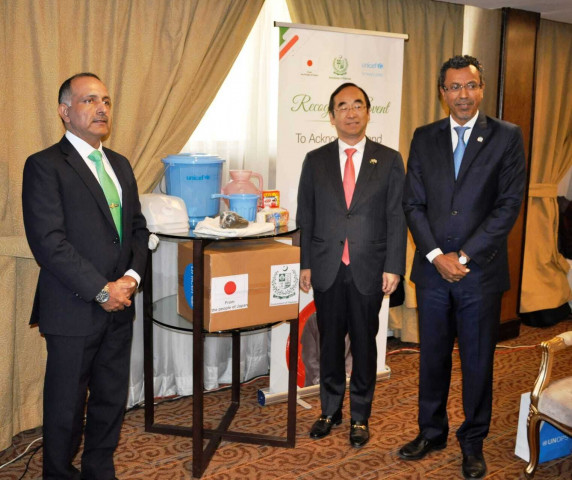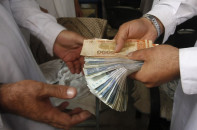Japan provides $4 million to Pakistan for flood relief
UNICEF to use funds for assisting flood affectees, improving WASH infrastructure in communities hosting refugees

The government of Japan has provided $4.196 million to the United Nations Children’s Fund (UNICEF), for its humanitarian services in the flood-affected areas of Pakistan.
The fund will also aid in improving water, sanitation, and hygiene (WASH) infrastructure in refugee settlements and host communities in Khyber-Pakhtunkhwa (K-P) and Balochistan.
According to a press release from the Japanese Embassy in Islamabad, an event was held on Friday to acknowledge and thank the government and the people of Japan for their generous support for the children in Pakistan.
The National Disaster Management Authority (NDMA) chief General Inam Haider Malik, Japanese Ambassador to Pakistan Wada Mitsuhiro, UNICEF representative in Pakistan Abdullah Fadil, and senior officials of the Pakistani government were present at the occasion.
The NDMA chief stated that “the government of Pakistan stands committed to maximizing support to its flood-affected people with the continued involvement of the international community.”
He maintained that Japan had always played a leading rolling in assisting Pakistan and was “gratefully acknowledged at people-to-people tiers”.
He furthered that UNICEF Pakistan was at the forefront of flood-relief initiatives and enabled the swift delivery of key relief aid articles to people in distress.
“The National Disaster Management Authority - the national Coordinating authority for all emergencies mitigation and Control - engages all stakeholders and donor agencies, to help investment in capacity building and developing sound robust national preparedness regime. We endorse the high value of UNICEF donations and thank the government of Japan for helping minimize the impact of the damage in the flood-affected areas of Pakistan,” he added.
Read '$4b' flood aid received so far
Using Japanese funds and working in coordination with national and provincial disaster management authorities and other relevant departments, UNICEF is working to ensure that host and refugee communities in the two provinces have access to improved WASH services.
These services include the provision of improved water quality and supply, regular cleaning of drains, improved solid waste management, and emergency WASH services in health centres and schools. This contributed to a significant reduction in the incidence of diseases caused by unsafe water and poor hygiene.
At the ceremony, the Japanese ambassador to Pakistan said, “Japan in partnership with UNICEF, has successfully supported Afghan refugees and their host communities in KP and Balochistan provinces in WASH and nutrition, ensuring the most vulnerable have access to safe water, hygiene facilities, and nutrition supplements.”
He maintained that as an immediate response to widespread flooding, Japan stood ready to provide emergency support to the affected by providing clean water and hygiene items.
Funds provided by Japan to UNICEF for its humanitarian services in the flood-affected areas are being used to provide safe drinking water, adequate sanitation, raise awareness about personal and communal hygiene, provision of hygiene kits, and scanning the nutritional status of children and women in camps and communities.
“We are extremely grateful for the generous funding from the Government of Japan to children and families at this critical juncture,” said UNICEF Representative Abdullah Fadil.
“It is the most vulnerable children and families who are bearing the brunt of the devastating floods and they need support to survive. Without action, more children will lose their lives in the weeks to come. Ensuring the availability of safe drinking water, sanitation, hygiene and medical and nutrition services is critical to avert further deaths,” he added.



















COMMENTS
Comments are moderated and generally will be posted if they are on-topic and not abusive.
For more information, please see our Comments FAQ